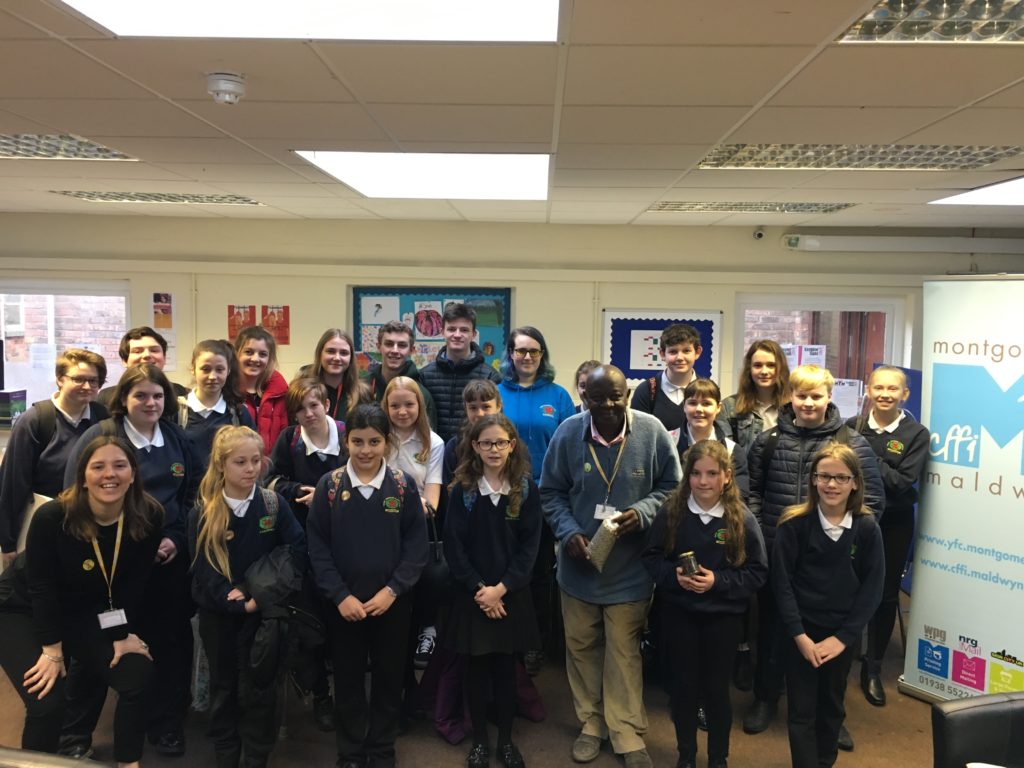Meeting Nimrod Wambette during Fairtrade Fortnight Megan Jones-Evans, Deputy Head Girl, Llanfyllin High School, Montgomeryshire
6/6/19
During Fairtrade Fortnight, we, sixth form pupils from Llanfyllin High School were the audience of a Fairtrade assembly ran by Ffion Storer Jones of Montgomeryshire Federation of Young Farmers Club (YFC) and Nimrod Wambette; a Fairtrade coffee farmer from Uganda.

It was a very interesting assembly for me because until then, I hadn’t really understood what Fair Trade really means. As well as paying the farmers a fairer price for their work, I learned about the Fair Trade premium, which is an extra amount of money that goes to the farmers’ communities, and that is used to buy items such as mosquito nets or school equipment for the community.
These combined effects can increase the rate of country education, and increase life expectancy – great developments that I hadn’t realised could be as a result of buying Fair Trade goods. I learned that there was no benefit in buying cheap coffee. Ffion explained in a simple way: “Nothing is ever cheap. If you are buy something under the price it is worth, someone somewhere will suffer. Often it is the farmers.”
After the assembly, we had a meeting of the School Assembly representatives, with Ffion, Nimrod and Elen, who works for the Future Generations Commissioner for Wales. The Future Generations Commissioner for Wales is responsible for ensuring sustainability for future generations. The opportunity to speak with the three, with very different experiences was interesting for several reasons. All were very positive upon hearing our ideas, and motivated us to create more change. But for me, the most interesting thing was the understanding of how it’s not just one thing; Fair Trade or the Well-being of Future Generations Act. I learned how any campaign related to social or environmental issues are interconnected.
For example, I learned that trying to improve the environment by reducing pollution, of any form; plastic, gas etc. can help farmers across the world by reducing extreme weather, which can destroy their crops. And of course, improving the environment is also an important part of the Well-being of Future Generations Act, as is making sustainable choices whilst shopping, by choosing local or Fairtrade items for example. I believe that if more people understood these links, they would be encouraged to try and do more, as they would appreciate that small actions can have a big impact.
We were inspired to start making change in our school, and we talked about several possible ways of doing it, such as trying initially to get Fairtrade bananas in the school canteen, or reducing the amount of single-use plastic we use. Since then, the school’s eco club has succeeded in creating the aim of having no single-use plastic bottles in the school. We also plan to investigate the number of Fairtrade items available in our school, and try to increase this.
Having Nimrod in our school was a vital part of developing our understanding and promote action. Nothing is as effective as having first-hand experience, and better yet, having a chat with the individual. Seeing the impact of meeting Nimrod on the School Assembly has prompted an interesting idea of trying to improve our school’s connection with schools in Uganda, through technology such as Skype, or letters, and ultimately, even a trip to Uganda for sixth form pupils.
I am supportive of all these ideas, I think that it would be an amazing and unforgettable experience – but that is something for the future. For now, we are going to try and spread the word about what we have learned through our school, with services, presentations and the above ideas.